One day at work, Larissa admitted to logging onto Facebook “to see my kids’ Easter pictures.”
She had been put on work furlough because the Alabama Department of Corrections deemed her a low security risk. She was allowed to leave prison to work shifts at a local Burger King.
While Larissa was logged on, someone sent her a message and she replied.
But when a third party got wind of the back-and-forth, that person decided to report her breach of prison protocol and Larissa (whose last name is withheld for her protection) was found guilty of “unauthorized participation in social networking.”
Her telephone, canteen, and visiting privileges were taken away for 45 days. She lost six months of “good time.” For looking at pictures of her children on Facebook, Larissa would be away from her children for a half-year more.
With mass incarceration receiving increased criticism from people on both sides of the political spectrum, including presidential hopefuls like Hillary Clinton and Rick Perry, many are questioning whether severely limiting prisoner access to the outside world is really in the public’s interest.
But now Facebook at least is starting to change how it views prisoners. When it comes to pulling down a prisoner’s Facebook profile, the company will no longer simply take a prison’s word for it.
“Facebook did recently adjust their procedures,” says Dave Maass of the Electronic Frontier Foundation (EFF), a San Francisco-based digital civil liberties nonprofit. “They’re now asking at least very basic questions of the prison before they take a prisoner’s page down—such as, ‘What exactly is the inmate doing that’s so dangerous?’”
A Facebook spokesperson adds in an emailed statement: “We work with law enforcement when we believe there is a genuine risk of physical harm or a direct threat to public safety.”
For years, the social media giant has been willing to take down almost any account a prison official asked them to, The Daily Beast has learned—despite a publicly stated policy that said otherwise.
Emails between the California Department of Corrections and Rehabilitation (CDCR) and Facebook—obtained by the Electronic Frontier Foundation through a Public Records Act request—reveal Facebook’s willingness to take down inmate profiles for “not following prison regulations” or simply “being incarcerated.”
“When we began to look into this about a year ago it seemed that Facebook was taking down inmate pages whenever a prison requested it, no questions asked,” says Maass.
After pressure from the EFF, each account will now be subject to more scrutiny than simply complying with requests from prison administrators.
The dominance of social media presents a daunting new challenge for prison officials and social media sites alike. It also brings about a potential opportunity for America’s incarcerated population. Stories like Larissa’s remind us how cruel prison policy can be in severing family ties—and how those unraveled ties can negatively affect a prisoner’s success once he or she gets out.
But then there’s the other argument—that if given access to social media, dangerous prisoners will use Facebook to stalk victims, harass the public, sell drugs, incite riots, or operate street gangs from behind bars.
In California, CDCR spokeswoman Dana Simas says a convicted child molester used a cellphone smuggled into prison to view the Facebook profile of his victim’s mother. He then sketched several portraits of the child based on the photos he’d seen online and mailed the drawings to the victim’s family.
When someone from the family called in to report the incident, the inmate’s cell was immediately searched and the contraband phone confiscated. A request was then sent by the CDCR to Facebook to have the inmate’s profile taken down.
“I understand both sides,” says Simas. “Not all prisoners are going to use Facebook in a sinister way, and the ones who do have other ways of getting their messages out—but Facebook is quick, easy, and direct, and it’s something we can’t properly monitor.”
The debate, civil rights advocates say, is not a new one.
“I don’t think Facebook poses any more security risk than a prisoner placing an ad in a newspaper, which is allowed in most states,” says David Fathi of the American Civil Liberties Union (ACLU). “Prisoners have been allowed to send mail outside since prisons began. This is an exaggerated fear of new technology.”
Both Maass and Fathi believe that with scarce resources and overcrowded jails—Alabama jails are at almost 200 percent capacity, the ACLU says—having corrections officers focus on Facebook activity does more harm than good.
“Prisons across the country charge extremely high rates for phone calls, video visitation, and even the limited amount of Internet they offer. Whenever you strengthen prohibition on something, you create the incentive for a black market, in this case for smuggling in free, contraband phones,” says Maass.
“I can understand why prisons don’t want inmates to have contraband cellphones. But I can also understand why inmates do this for reasons that have absolutely nothing to do with crime.”
Smuggled cellphones have become rampant in prisons across the U.S. In response, prison administrators have begun to mete out harsh punishments when a contraband phone is found.
In Florida, possession of a smuggled phone is a third-degree felony that carries a maximum of five years of prison time. In Mississippi, the maximum punishment is a 15-year increase to a sentence.
This brings up the concern that Facebook is inadvertently allowing prison officials to use the “Inmate Account Takedown Request” option as a means to track down and punish the use of contraband phones.
“In South Carolina prisons, they’re giving out years in solitary confinement as punishment for using Facebook,” says Maass. “Other states give 60 to 90 days, or they cut off visitation or phone privileges.”
In one case Maass uncovered in South Carolina, a prisoner’s punishment for posting on Facebook was 37 years in solitary confinement.
The Alabama Department of Corrections even punished a prisoner for administering a Facebook page called the “Free Alabama Movement.” In documents obtained by the ACLU, the same prisoner, whose name is being withheld for his protection, was revealed to have led a nonviolent worker strike designed to bring attention to prison conditions.
“Facebook styles themselves as advocates of free speech and free expression,” says Fathi. “It’s ironic that they’re acting as an accomplice to censorship by taking down profiles just because a prison asked them to—basically doing their dirty work.”
“It’s not new for inmates to find ways to impact social affairs,” says Maass, “from Martin Luther King’s famous Letter From Birmingham Jail to Chelsea Manning tweeting from Fort Leavenworth during her trial. Just because you’re in prison doesn’t mean you can’t have a political voice.”
“But if you think about how Facebook works,” Maass continues, “it’s not just inmate-generated content they’re taking down. People often have long conversations under a photo. When Facebook removes a profile, all this content is gone. As a private company, Facebook can do whatever they want, but when they are collaborating on behalf of a government entity—that’s censorship.”
As states across the U.S. attempt to save tax dollars by reducing the prison population and recidivism, any viable solution to the Facebook quandary has to address both public safety and prisoner reentry.
“We have to remember that more than 95 percent of prisoners are getting out,” says Fathi. “Disabling them from what has become a basic skill in our society is not in anyone’s interest.”
“As Facebook evolves, this could change,” says Simas. “I understand why inmates are interested in learning modern technology, but we have to find a way to make it safe.”






